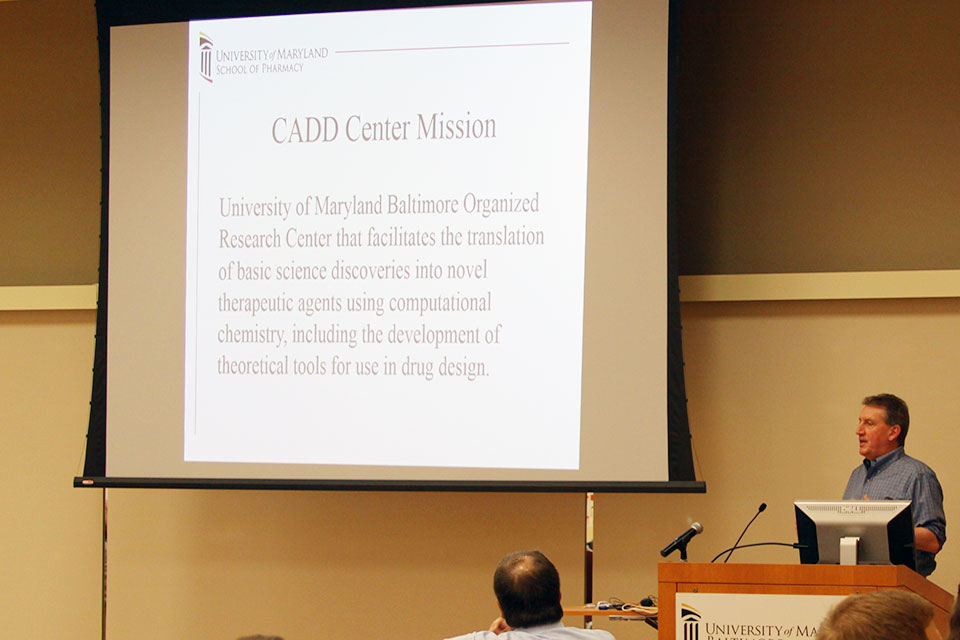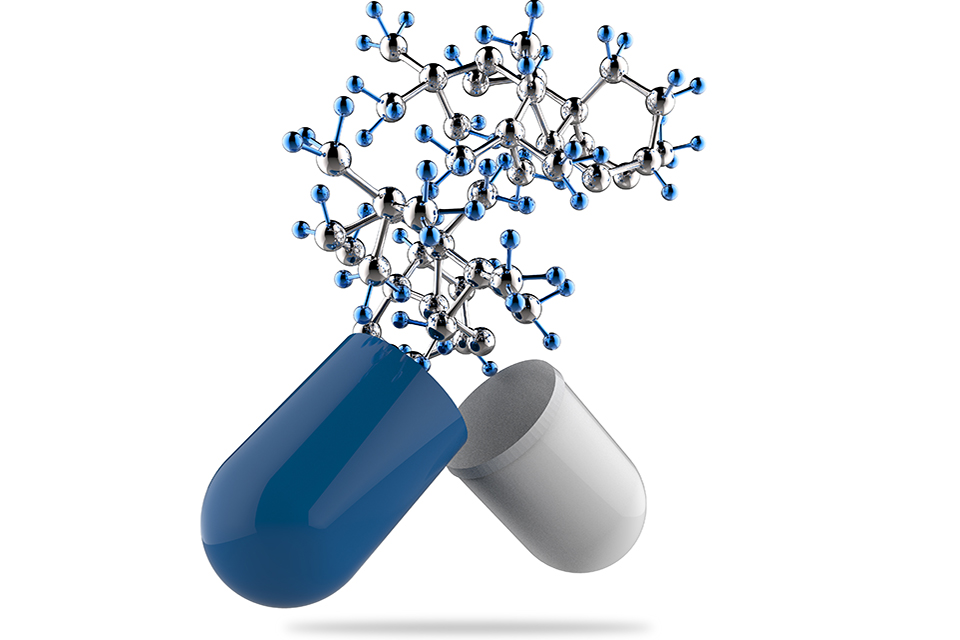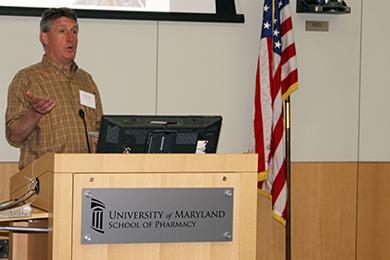Grollman Lecture Highlights Lessons Learned from Academic Drug Discovery
Speaker Shaomeng Wang, PhD, discusses ongoing research in his lab and his team’s experience navigating the drug development process, from drug design to clinical trials.
By Malissa Carroll
September 20, 2013
Shaomeng Wang, PhD, Warner-Lambert/Parke-Davis Professor in Medicine at the University of Michigan School of Medicine and professor of medicinal chemistry at the University of Michigan College of Pharmacy, delivered the annual Ellis S. Grollman Lecture in the Pharmaceutical Sciences at the University of Maryland School of Pharmacy on September 16. His lecture, titled “Targeting Protein-Protein Interactions for New Cancer Therapeutics,” presented an overview of his lab’s work to develop new drugs for the treatment of cancer and spotlighted lessons that his team has learned while navigating the drug development process.
“The Ellis S. Grollman Lecture in the Pharmaceutical Sciences is one of many endowed lectures that the School of Pharmacy is fortunate to be able to offer to our faculty, staff, and students,” said Natalie D. Eddington, PhD, FAAPS, FCP, dean and professor of the School of Pharmacy. “These lectures allow us to bring renowned scientists, practitioners, academicians, and policy experts to the School to speak with us about a wide range of important topics in an area of pharmacy or pharmaceutical research.”
As co-director of the Molecular Therapeutics Program at the University of Michigan Comprehensive Cancer Center and director of the university’s Cancer Drug Discovery Program, Wang’s primary research interest is the discovery and development of novel small-molecule therapeutics for the treatment of cancer, as well as other diseases and conditions. He is the co-founder of three biotechnology companies that work to develop innovative anticancer medicines with technologies licensed primarily from the University of Michigan.
“Dr. Wang’s remarkable research in the rational design and development of anticancer agents made him a clear choice for this year’s Ellis S. Grollman Lecture,” says Alexander MacKerell, PhD, Grollman-Glick Professor of Pharmaceutical Sciences and director of the Center for Computer-Aided Drug Design at the School of Pharmacy. “He has tirelessly worked to develop a cutting-edge research program that spans a wide range of scientific fields, from computational chemistry to synthetic chemistry and pharmacology, ultimately leading to clinical studies. When the School of Pharmacy initiated its own drug design program nearly 15 years ago, Dr. Wang helped us get started by providing both scientific advice and access to invaluable drug design databases. His work represents a significant achievement and continues to serve as a model for ongoing drug discovery efforts at our School.”
Wang began his lecture with an outline of the lessons that his team has learned from their work in academic drug discovery. “Although my training primarily concentrated in computational modeling, I realized that if I truly wanted to make an impact in drug discovery through my research, it would be important for me to not only work to develop new compounds, but to put the necessary tools in place that would allow me to advance those compounds into clinical trials,” he remarked.
He discussed the work his team has done to target key apoptosis regulators for new anticancer drugs. Apoptosis, the process of programmed cell death, plays an important role in all human cancers.
“We have learned that many human diseases, including cancer, begin with deregulated programmed cell death,” said Wang. “Tumor cells work hard to resist programmed cell death, which is why a number of anticancer drugs have been designed to induce apoptosis. However, overexposure to these drugs can make tumor cells resistant to their effects.”
Wang spoke about the interaction between two proteins involved in the development of cancer, p53 and MDM2. He discussed p53’s role as a tumor suppressor and noted how MDM2 acts as an inhibitor that prevents p53 from stopping tumor growth. He noted that the goal of his team’s research was to develop a small-molecule antagonist for MDM2.
“Traditionally, it has been very difficult to develop a drug that targets protein-protein interaction, such as that between p53 and MDM2,” said Wang. “Many of the current drugs that target the interaction between p53 and MDM2 cause a lot of undesirable side effects, including kidney damage, because they are not only toxic to the tumor cells, but also to normal cells. We wanted to develop a small-molecule drug that was both highly effective and non-toxic to normal cells.”
He also introduced the concept of scaffold design, in which researchers opt to not begin investigations with a lead compound that they seek to optimize. Instead, they design a small “chemical scaffold” that can be built upon to develop a collection of lead compounds.
“With a scaffold, we look for drug-like properties within the compound,” said Wang. “We look for a balance of hydrophobic and hydrophilic properties, stability within the compound, and a rigid structure. These characteristics will help us achieve the optimal potency and activity with our design.”
As a result of this research, Wang and his research team have advanced three novel anticancer drugs into Phase I and Phase II human clinical trials. Two additional compounds have been advanced into investigational new drug-enabling studies. “We are now seeing the fruits of our research, confirming that researchers in academia can make an impact on drug discovery and advance their compounds to clinical development,” he said.



